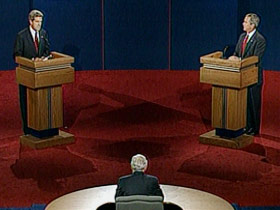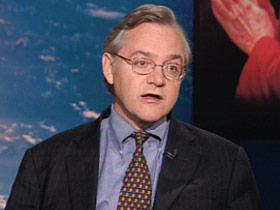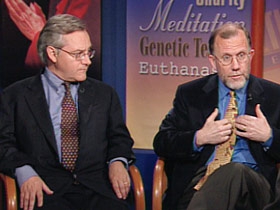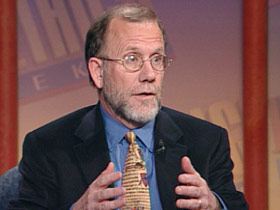In This Episode << SLIDE LEFT TO SEE ADDITIONAL SEGMENTS
Election 2004: Domestic Issues
BOB ABERNETHY, anchor: We want to return now to the surprising, extended discussion of religion in this week’s presidential debate. President Bush and Senator Kerry were asked by moderator Bob Schieffer what role faith plays in their policy-making. Here is part of what each candidate said:

PRESIDENT BUSH: I pray a lot. And I do. And my faith is a very, it’s very personal. I pray for strength. I pray for wisdom. I pray for our troops in harm’s way. I pray for my family. I pray for my little girls. But I’m mindful in a free society that people can worship if they want to or not. You’re equally an American if you choose to worship an Almighty and if you choose not to. If you’re a Christian, Jew or Muslim you’re equally an American. That’s the great thing about America is the right to worship the way you see fit. Prayer and religion sustain me. I receive calmness in the storms of the presidency. … I never want to impose my religion on anybody else. But when I make decisions I stand on principle. And the principles are derived from who I am. I believe we ought to love our neighbor like we love ourself.
SENATOR KERRY: Well, I respect everything that the president has said and certainly respect his faith. I think it’s important and I share it. I think that he just said that freedom is a gift from the Almighty. Everything is a gift from the Almighty. … I was taught that the two greatest commandments are: love the Lord your God with all your mind, your body and your soul; and love your neighbor as yourself. And frankly, I think we have a lot more loving of our neighbor to do in this country and on this planet. … The president and I have a difference of opinion about how we live out our sense of our faith. I talked about it earlier when I talked about the works and faith without works being dead. I think we’ve got a lot more work to do. And as president I will always respect everybody’s right to practice religion as they choose or not to practice, because that’s part of America.
ABERNETHY: With me to talk about what the candidates said about religion — and about other principles underlying the issues — are Michael Cromartie, vice president of the Ethics and Public Policy Center in Washington and a member of the U.S. Commission on International Religious Freedom. Also, E. J. Dionne of THE WASHINGTON POST, the Brookings Institution, and Georgetown University.

E. J., let’s begin with that remarkable discussion by the candidates of religion. I don’t think I can remember ever hearing anything like that before.
E. J. DIONNE (Columnist, WASHINGTON POST, and Senior Fellow, Brookings Institution): I don’t either. And I think whether you’re for Bush or for Kerry, it was a remarkable moment in American politics. You heard two views of religion very much rooted in our national tradition. On the one side was President Bush’s view, which was very personal. He talked about the strength and comfort he got from religion. And on Senator Kerry’s side you heard an insistence that religion has important social and political implications. He quoted one of my favorite lines from the scriptures, from the Letter of James, “Faith without works is dead.” That’s a very important teaching to all Christians, particularly in the African-American church among progressive Christians. It’s a good place to begin a political conversation.
ABERNETHY: Michael, what did you hear?
MICHAEL CROMARTIE (Vice President, Ethics and Public Policy Center): Well, it was remarkable, Bob. And it’s clear that the handlers of President Bush and of Senator Kerry are people who have read the polls. And recently, the polls have been telling us that the American people, for some reason, want their candidate for president to be a person of faith — no matter what kind of faith. They just want them to be pious, religious people. And so, if you’re going to appeal to the American public, you’ve got to find a way to speak in a public language that resonates with people religiously, that seems authentic, that’s real, personable, and as E. J. said, ties together both the personal dimension and also what the implications of that are for public policy.
ABERNETHY: And underlying the issues — not only religious beliefs and how you see it from a religious perspective but also philosophical ones — how would you in a few words, Michael, how would you sum up a conservative political philosophy?

Mr. CROMARTIE: Well, I think that a conservative political philosophy would begin by saying the individual is prior to the state. The state is not the final arbiter of everything. However, a conservative political philosophy would have a strong role for the state. But it would be sort of a limited role, in a strong fashion for the state, if you will. And I don’t mean to sound paradoxical, but it means that the state is there to be a watcherover injustice, and to curb evil and to curb sin, if you will. And so, but the role of state is not therefore to get more expansive and more expansive. And I think the conservative critiques the liberal in this part by saying that the state must not become too big and overly expansive.
ABERNETHY: E. J., what would a progressive American say?
Mr. DIONNE: Well, I think a progressive would assert on the one hand — here I’m not sure [that] there’s a huge difference in principle, that there may be in practice with conservatives — that the individual dignity is inviolable. And so liberals do also begin with the individual. But I think they would also assert that there is a responsibility on the part of the community to empower individuals to lift up the poor, to comfort the afflicted. And that — I think the liberal would say that conservatives talk all the time about original sin and fallen human nature. And the reason that we’ve turned to government to help people — help lift people up — is because we know that none of us individually ever gives enough to the poor, ever does enough. And we turn to government, especially in areas like health care, which is so expensive, to make sure that a lot of people who deserve help are not left out. And I think the core difference between the liberal and the conservative is that the liberal would assert that the government can play a legitimate role without violating the rights of individuals.
ABERNETHY: So how does this play out then, Michael, in particular issues? Pick your issue. How would — where would we see these differences in philosophies, and perhaps in religious interpretation, affecting how the debate is carried out?
Mr. CROMARTIE: Well, the phrase has been overused, but it’s the president’s phrase — is “compassionate conservatism.” And I think what he means there is that the government has a role, has a strong role, but it’s a limited role. He wants to encourage what he calls the opportunity society. He has looked at the social science literature, and there is a lot of it that says some of our most well-intended programs in the War on Poverty actually made matters worse for the poor. And so I think the president and his advisors look at that and they say, “Well, what can we do to not encourage dependency on the government, to not encourage irresponsibility among males?”, because certain programs seem to indicate that they did that. And so I think they would want to say that we’re “pro-poor.” But pro-poor doesn’t mean a government program every time a problem comes up.
Mr. DIONNE: And the War on Poverty is underrated. Head Start is a successful program that the president supports, Medicare is a successful program that the president supports. The Job Corps was a very successful program. I do think that there is a clear history, that yes, government makes mistakes and we have abandoned some government programs. But the government can empower individuals, and you can’t have an ownership society if the poor have no money to own anything. And I think that is again — to go to your question — the core difference between liberals and conservatives. The government has the power to empower individuals and help them move forward and expand their opportunities. The G.I Bill is one of my favorite programs because it combined a sense of personal responsibility to the common weal with the idea that the government can help lift people up.

ABERNETHY: And how else does the difference in philosophy show up in issues of this campaign, Michael?
Mr. CROMARTIE: Well, I think there would be differences, for instance, on foreign policy. I mean clearly, both candidates want to stop the problem of terrorism in the world. And so there’s differences about how best prudently to do that. And so clearly one candidate is not a pacifist and the other is a just war person. They both believe in the use of force. But there are differences about deciding what the U.S. role in the world is on these questions.
ABERNETHY: Other things, domestic things — the deficit, environmental protection — what else?
Mr. DIONNE: Well, deficit and environmental protection I think both go to the idea of stewardship, that you have a responsibility to the Earth; you also have a responsibility to run your finances in a way that don’t burden the next generation. And I think those two questions are at the heart of this campaign. And obviously you have some very difficult issues — abortion, stem cell research — that move a lot of voters. And that, I think, if we’re honest with ourselves, are morally very difficult and very complicated issues. And you saw those debated, though it was striking that the president didn’t want to say he [would] overturn ROE V. WADE. And I think he understood that there is an ambivalence in the public about abortion.
ABERNETHY: Michael, very quickly?
Mr. CROMARTIE: Well, as the president said, he was not going to apply a litmus test to justices, as Senator Kerry is going to apply.
ABERNETHY: Well, I’m sorry, our time is up. Michael Cromartie and E. J. Dionne. This conversation is the second of three, and the next one will resume in two weeks.

